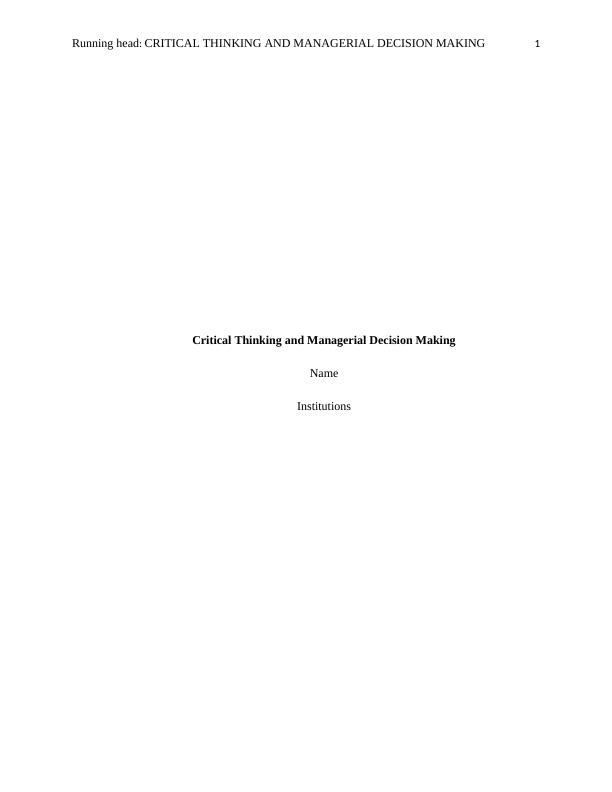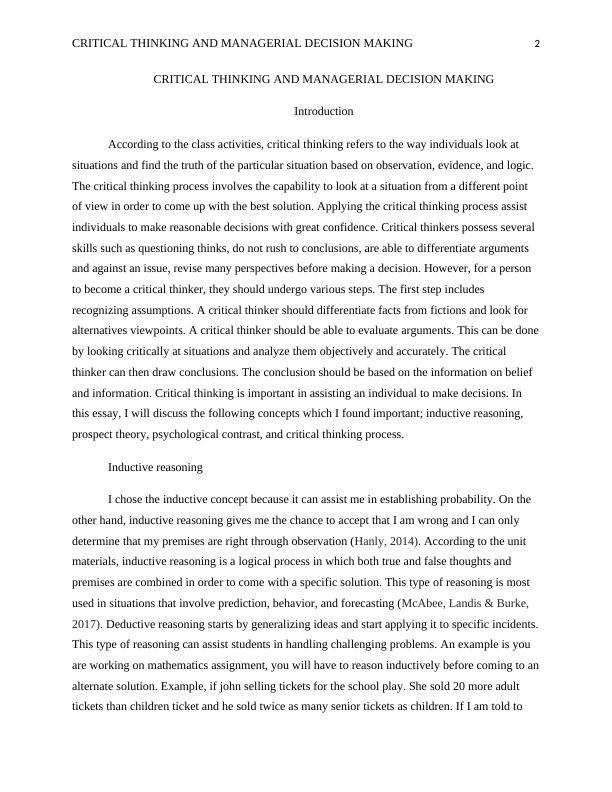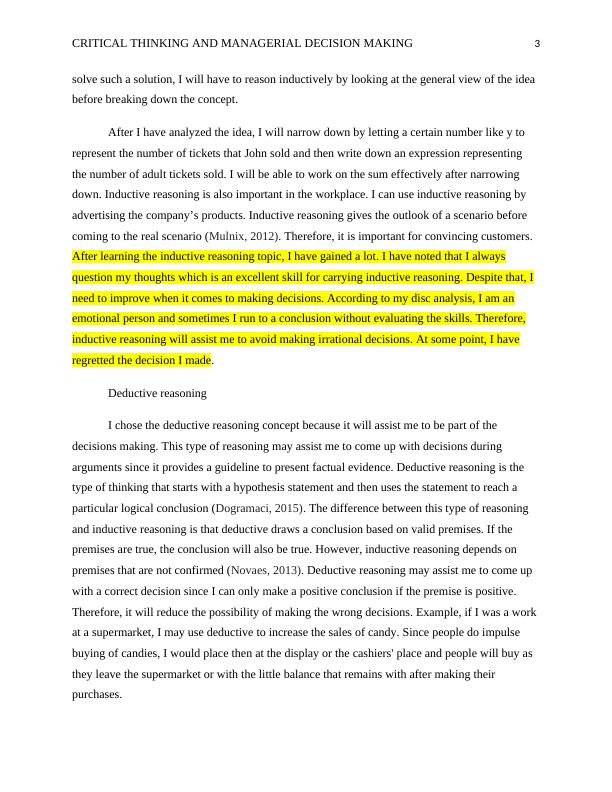Critical Thinking and Managerial Decision Making: Exploring Inductive Reasoning and Psychological Contrast
Added on 2023-04-25
9 Pages3028 Words288 Views
Running head: CRITICAL THINKING AND MANAGERIAL DECISION MAKING 1
Critical Thinking and Managerial Decision Making
Name
Institutions
Critical Thinking and Managerial Decision Making
Name
Institutions

CRITICAL THINKING AND MANAGERIAL DECISION MAKING 2
CRITICAL THINKING AND MANAGERIAL DECISION MAKING
Introduction
According to the class activities, critical thinking refers to the way individuals look at
situations and find the truth of the particular situation based on observation, evidence, and logic.
The critical thinking process involves the capability to look at a situation from a different point
of view in order to come up with the best solution. Applying the critical thinking process assist
individuals to make reasonable decisions with great confidence. Critical thinkers possess several
skills such as questioning thinks, do not rush to conclusions, are able to differentiate arguments
and against an issue, revise many perspectives before making a decision. However, for a person
to become a critical thinker, they should undergo various steps. The first step includes
recognizing assumptions. A critical thinker should differentiate facts from fictions and look for
alternatives viewpoints. A critical thinker should be able to evaluate arguments. This can be done
by looking critically at situations and analyze them objectively and accurately. The critical
thinker can then draw conclusions. The conclusion should be based on the information on belief
and information. Critical thinking is important in assisting an individual to make decisions. In
this essay, I will discuss the following concepts which I found important; inductive reasoning,
prospect theory, psychological contrast, and critical thinking process.
Inductive reasoning
I chose the inductive concept because it can assist me in establishing probability. On the
other hand, inductive reasoning gives me the chance to accept that I am wrong and I can only
determine that my premises are right through observation (Hanly, 2014). According to the unit
materials, inductive reasoning is a logical process in which both true and false thoughts and
premises are combined in order to come with a specific solution. This type of reasoning is most
used in situations that involve prediction, behavior, and forecasting (McAbee, Landis & Burke,
2017). Deductive reasoning starts by generalizing ideas and start applying it to specific incidents.
This type of reasoning can assist students in handling challenging problems. An example is you
are working on mathematics assignment, you will have to reason inductively before coming to an
alternate solution. Example, if john selling tickets for the school play. She sold 20 more adult
tickets than children ticket and he sold twice as many senior tickets as children. If I am told to
CRITICAL THINKING AND MANAGERIAL DECISION MAKING
Introduction
According to the class activities, critical thinking refers to the way individuals look at
situations and find the truth of the particular situation based on observation, evidence, and logic.
The critical thinking process involves the capability to look at a situation from a different point
of view in order to come up with the best solution. Applying the critical thinking process assist
individuals to make reasonable decisions with great confidence. Critical thinkers possess several
skills such as questioning thinks, do not rush to conclusions, are able to differentiate arguments
and against an issue, revise many perspectives before making a decision. However, for a person
to become a critical thinker, they should undergo various steps. The first step includes
recognizing assumptions. A critical thinker should differentiate facts from fictions and look for
alternatives viewpoints. A critical thinker should be able to evaluate arguments. This can be done
by looking critically at situations and analyze them objectively and accurately. The critical
thinker can then draw conclusions. The conclusion should be based on the information on belief
and information. Critical thinking is important in assisting an individual to make decisions. In
this essay, I will discuss the following concepts which I found important; inductive reasoning,
prospect theory, psychological contrast, and critical thinking process.
Inductive reasoning
I chose the inductive concept because it can assist me in establishing probability. On the
other hand, inductive reasoning gives me the chance to accept that I am wrong and I can only
determine that my premises are right through observation (Hanly, 2014). According to the unit
materials, inductive reasoning is a logical process in which both true and false thoughts and
premises are combined in order to come with a specific solution. This type of reasoning is most
used in situations that involve prediction, behavior, and forecasting (McAbee, Landis & Burke,
2017). Deductive reasoning starts by generalizing ideas and start applying it to specific incidents.
This type of reasoning can assist students in handling challenging problems. An example is you
are working on mathematics assignment, you will have to reason inductively before coming to an
alternate solution. Example, if john selling tickets for the school play. She sold 20 more adult
tickets than children ticket and he sold twice as many senior tickets as children. If I am told to

CRITICAL THINKING AND MANAGERIAL DECISION MAKING 3
solve such a solution, I will have to reason inductively by looking at the general view of the idea
before breaking down the concept.
After I have analyzed the idea, I will narrow down by letting a certain number like y to
represent the number of tickets that John sold and then write down an expression representing
the number of adult tickets sold. I will be able to work on the sum effectively after narrowing
down. Inductive reasoning is also important in the workplace. I can use inductive reasoning by
advertising the company’s products. Inductive reasoning gives the outlook of a scenario before
coming to the real scenario (Mulnix, 2012). Therefore, it is important for convincing customers.
After learning the inductive reasoning topic, I have gained a lot. I have noted that I always
question my thoughts which is an excellent skill for carrying inductive reasoning. Despite that, I
need to improve when it comes to making decisions. According to my disc analysis, I am an
emotional person and sometimes I run to a conclusion without evaluating the skills. Therefore,
inductive reasoning will assist me to avoid making irrational decisions. At some point, I have
regretted the decision I made.
Deductive reasoning
I chose the deductive reasoning concept because it will assist me to be part of the
decisions making. This type of reasoning may assist me to come up with decisions during
arguments since it provides a guideline to present factual evidence. Deductive reasoning is the
type of thinking that starts with a hypothesis statement and then uses the statement to reach a
particular logical conclusion (Dogramaci, 2015). The difference between this type of reasoning
and inductive reasoning is that deductive draws a conclusion based on valid premises. If the
premises are true, the conclusion will also be true. However, inductive reasoning depends on
premises that are not confirmed (Novaes, 2013). Deductive reasoning may assist me to come up
with a correct decision since I can only make a positive conclusion if the premise is positive.
Therefore, it will reduce the possibility of making the wrong decisions. Example, if I was a work
at a supermarket, I may use deductive to increase the sales of candy. Since people do impulse
buying of candies, I would place then at the display or the cashiers' place and people will buy as
they leave the supermarket or with the little balance that remains with after making their
purchases.
solve such a solution, I will have to reason inductively by looking at the general view of the idea
before breaking down the concept.
After I have analyzed the idea, I will narrow down by letting a certain number like y to
represent the number of tickets that John sold and then write down an expression representing
the number of adult tickets sold. I will be able to work on the sum effectively after narrowing
down. Inductive reasoning is also important in the workplace. I can use inductive reasoning by
advertising the company’s products. Inductive reasoning gives the outlook of a scenario before
coming to the real scenario (Mulnix, 2012). Therefore, it is important for convincing customers.
After learning the inductive reasoning topic, I have gained a lot. I have noted that I always
question my thoughts which is an excellent skill for carrying inductive reasoning. Despite that, I
need to improve when it comes to making decisions. According to my disc analysis, I am an
emotional person and sometimes I run to a conclusion without evaluating the skills. Therefore,
inductive reasoning will assist me to avoid making irrational decisions. At some point, I have
regretted the decision I made.
Deductive reasoning
I chose the deductive reasoning concept because it will assist me to be part of the
decisions making. This type of reasoning may assist me to come up with decisions during
arguments since it provides a guideline to present factual evidence. Deductive reasoning is the
type of thinking that starts with a hypothesis statement and then uses the statement to reach a
particular logical conclusion (Dogramaci, 2015). The difference between this type of reasoning
and inductive reasoning is that deductive draws a conclusion based on valid premises. If the
premises are true, the conclusion will also be true. However, inductive reasoning depends on
premises that are not confirmed (Novaes, 2013). Deductive reasoning may assist me to come up
with a correct decision since I can only make a positive conclusion if the premise is positive.
Therefore, it will reduce the possibility of making the wrong decisions. Example, if I was a work
at a supermarket, I may use deductive to increase the sales of candy. Since people do impulse
buying of candies, I would place then at the display or the cashiers' place and people will buy as
they leave the supermarket or with the little balance that remains with after making their
purchases.

End of preview
Want to access all the pages? Upload your documents or become a member.
Related Documents
Critical Thinking and Managerial Decision-Makinglg...
|9
|2273
|160
Critical Thinking and Managerial Decision-Makinglg...
|10
|2227
|112
Critical Thinkinglg...
|11
|2870
|300
Critical Thinking and Managerial Decision Makinglg...
|8
|2744
|452
Critical Thinking: Enhancing Decision Making and Argumentation Skillslg...
|12
|2942
|358
Critical Thinking and Decision Makinglg...
|11
|3163
|78
